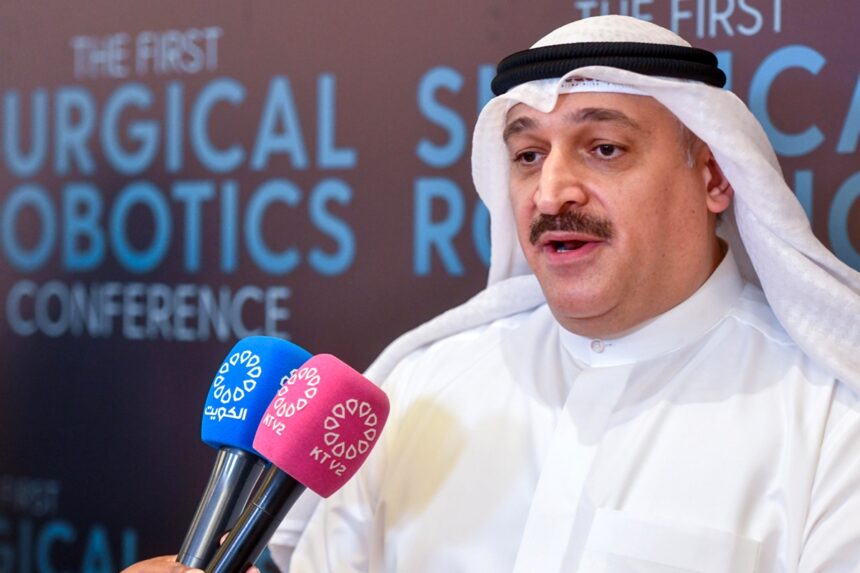Minister of Health Dr. Ahmed Al-Awadi emphasized today, Monday, that the rapid spread of antibiotic-resistant bacteria is a worrying phenomenon exacerbated by the indiscriminate use of antibiotics, highlighting the ministry’s awareness of this challenge.
In his opening speech at the Sixth Conference of Medical Laboratories titled “Advances in Clinical Microbiology and Quality Control”, Minister Al-Awadi stated that the ministry has taken decisive steps to confront this challenge by appointing a specialized liaison officer to work with the World Health Organization (WHO) since 2021. This officer is responsible for collecting comprehensive and accurate data about these bacteria from all microbiology laboratories within the ministry, which is then directly submitted to the WHO.
He added that Kuwait, as part of this international cooperation, submitted precise and comprehensive data covering 59,926 samples during 2023, demonstrating its deep commitment to supporting global efforts in combating antimicrobial resistance. The data included information on fungi causing sepsis, which enhances the global system’s ability to analyze and monitor these complex cases, positioning Kuwait as a leading country in precise and integrated medical surveillance.
Minister Al-Awadi explained that Kuwait has adopted strict and innovative policies to regulate antibiotic use in all its healthcare facilities, aligning with the ambitious goals of the global action plan to combat antimicrobial resistance and within the framework of the AWARE program.
He also mentioned that Kuwait has implemented advanced methodologies for classifying and applying antibiotics, thereby proving its firm commitment to providing a resilient healthcare system capable of meeting challenges with the highest standards of professionalism and quality.
Al-Awadi highlighted that Kuwait, as part of its dedicated efforts to enhance health security, has proven its leading position through its strategic partnership with the WHO by joining the global GLASS (Global Antimicrobial Resistance Surveillance System). This serious partnership reflects Kuwait’s long-term vision to position itself at the forefront globally and contribute to shaping decisive health responses.
He pointed out that microbiology laboratories in healthcare facilities play a pioneering role in diagnosing infectious diseases through advanced laboratory techniques. Their role goes beyond diagnosis to monitoring healthcare-associated infections and identifying their causes, especially those characterized by high multi-drug resistance that poses obstacles to effective treatment and complicates infection control.
On her part, Dr. Rama Al-Saffi, Director of the Medical Laboratories Department and Chairperson of the conference, said in her speech that training medical teams, enriching their scientific knowledge, and developing their professional skills in line with the rapid scientific advancements in all medical science fields is one of the most important goals the ministry seeks to achieve.
Al-Saffi added that this ensures the provision of the best healthcare services according to global standards. Medical conferences are one of the means to achieve this, which is also the aim of this conference: to raise scientific and clinical levels and exchange experiences among doctors, laboratory technicians, public health professionals, and healthcare providers in general.
She noted that medical laboratories are one of the essential pillars supporting any healthcare system, and the accuracy and timeliness of lab results assist physicians in determining and monitoring patient treatment plans.
Al-Saffi explained that the ministry’s medical laboratories conduct more than 45 million lab tests annually across 29 laboratories in hospitals and specialized health centers, and 98 laboratories in primary healthcare centers. Moreover, an internal quality system is applied daily, and the laboratories participate in over 13 internationally accredited external quality control programs to verify the accuracy and efficiency of nearly 900 laboratory devices.
She pointed out that the conference highlights the latest updates in global quality control programs in medical laboratories and recent advances in clinical microbiology. It aims to facilitate knowledge exchange among participants and strengthen communication between doctors, lab technicians, and other specialists in the field.
Al-Saffi mentioned that the two-day conference hosts 25 expert lecturers specializing in clinical laboratories from international, regional, and local levels. It includes more than 20 scientific lectures, three training courses, and several panel discussions.
Meanwhile, Dr. Ibtisam Al-Jumaa, Chairperson of the Ministry’s Laboratory Departments Council, affirmed their commitment to achieving the highest health and wellness standards for the community through unveiling the latest developments in diagnosing infectious diseases and identifying the causative germs, bacteria, and parasites.
Al-Jumaa stated that microbiology laboratories received over 1,428,000 samples in 2023, and approximately 2,616,000 tests were conducted, reflecting the tremendous effort and dedication of the team of technicians and specialized doctors.
She noted that the ministry’s laboratories operate under the highest local quality control standards, ensuring the accuracy and reliability of laboratory results. The pursuit of international accreditation known as ISO 15189 by the Medical Laboratories Department is further proof of their commitment to excellence.


.png)
